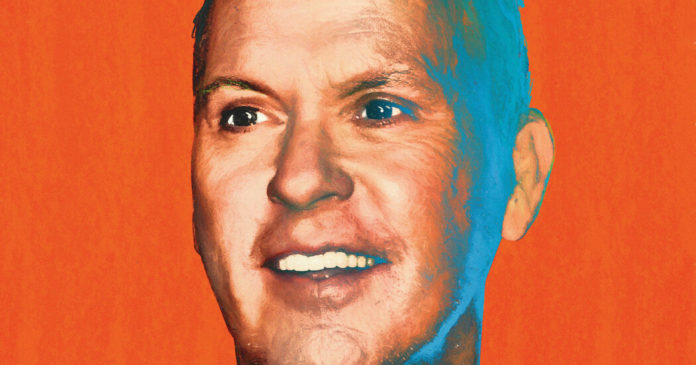Michael Keaton has been a star for long enough to have gone through multiple and distinctly different cycles of fame and artistic expression. He has zigzagged through the years from the gleeful anarchic charge of his comedic work in his early hit films like “Night Shift” (1982) and “Mr. Mom” (1983) to megastardom via the gothic “Batman” (1989) and even more gothic “Batman Returns” (1992). Then, after a period in the wilderness in the 2000s, he made a welcome comeback, kicked off by his detailed and widely praised character work in “Birdman” (2014). He’s such a familiar, even nostalgic, figure at this point that it’s easy to take his uniqueness for granted. It’s hard to think of another actor capable of, say, the manically riffing poltergeist he played in “Beetlejuice” (1988) and the layered gravitas of a latter-day role like his hard-nosed Boston Globe editor Walter Robinson in “Spotlight” (2015). But no matter the part — and I think this is essential to his appeal — Keaton, who is 69, always exudes an intense (and intensely American) self-reliance, a defiant independence. That quality is on display in various forms in his recent work as a contract killer in the thriller “The Protégé,” released in August; as Kenneth Feinberg, the real-life lawyer in charge of dispensing the 9/11 victims compensation fund in “Worth,” which premieres on Netflix Sept. 3; and as a small-town doctor whose eyes gradually open to the opioid crisis in the Hulu limited series “Dopesick,” slated for release on Oct. 13. “There’s something to getting older,” says Keaton, a digressive and keyed-up talker, who paced nonstop through his Montana home as we spoke via Zoom. “Not only do the roles get a little different, but your interpretation of them might be more interesting too.”
A few years ago in an interview you said that there was a point in your career, I guess it was in the mid-2000s before you sort of disappeared for a while, where you got tired of your own voice. You said you sounded inauthentic to yourself. How did that show up in the work? And what made you not tired of your voice anymore? I have wide interests, or catholic interests, as they say, and when you’re like that, you reach a point where you go, “OK, I still have to make a living so I have to take certain acting jobs,” and you try to do your best. Then you start to literally get tired of hearing your own voice, and also metaphorically get tired. You kinda go, “Am I a bullshitter right now?” But you say, “Hey, man, I’m fortunate enough to have a gig.” And I pass up a lot of work. I’ve passed up so much work over the years because I was curious about other things. I wanted to live life. Maybe it’s that nothing was coming around that made me interested. But I think work’s real important. I’m looking forward to a time when my work becomes other work, frankly. Like I’m involved with this environmentally conscientious construction company. I don’t know. Maybe I got bored with acting. That sounds so cavalier: “I was bored.” But I probably did get a little bored with myself. People forget about you, and I’m off doing other things. But I thought: I’ll be all right. Better roles will come around. Then, you know that whole thing of how you can manifest things? It’s doable. Your attitude, how you look at things and what you can create is more in your power than a lot of people think.
What’s the trick? Here’s the deal: Everything comes down to the question of what do you want? You keep going back to what you want and you go, “Well, I have this,” but, yeah, what do you want? Then you have to drill down and have the balls to say, “If that’s what you really want, then you have to do X.” You know what the rest of it is? Good fortune. A couple of things go your way. Alejandro González Iñárritu calls my agent, and he goes, “I want to talk to him about this movie.” Because I like sports so much I use probably too many sports metaphors, but you gotta get tough and be competitive and not want to lie down. Certain things started coming around for me because I said, “I’m not lying down.” I don’t know. I’m probably overanalyzing it.
Keaton in “Birdman” (2014).
Fox Searchlight Pictures, via Everett Collection
So when you asked yourself what you really wanted, what did you come up with? Dude, dude, dude. We do not have time. We seriously do not have time for that. Trust me. That’s a whole other conversation. I don’t think print serves that question, to be really honest with you. It’s not like a thing you can touch.
OK. But then what do you actually do after you ask yourself what you really want? You’ll come up with another answer. Then you’ll have to keep asking yourself, Yeah, but what is that? And then if you can live in that — without sounding like I’m saying something that makes me want to go outside and vomit — you kind of raise your consciousness.
I’m not sure I totally follow but — Can I add this?
Please. I’m blessed-slash-cursed with a bit of a chip on my shoulder. I keep it there because it’s motivational.
OK, so to get back on track: You had a period where you would do performances and they wouldn’t ring true? I’m just trying to get a handle. So you hear yourself speaking, you’re in a scene, and it doesn’t necessarily not ring true, it’s just kind of a sound you’re doing that’s too familiar. I can’t explain it. I think there was a little overall boredom but not with the business — bored with me. Then the next level of that is are you having any fun or are you even really any good right now? So you’d stop, step back and reassess. Do some other things. Frankly the reason — a reason — that a person can be more effective as an actor — boy I hate acting talk.
Indulge me. You’re the boss. I think you become a better actor if you have a world awareness and if you have experiences and you hear the way people speak. It was also a pride thing, eventually wanting to do more stuff. After a while you kind of go: I got some ammunition left. But I was living. I was doing some things, I was picking up a little bit of work. My attitude was make ’em throw you your pitch. Foul off a few. Take close ones right on the edge of the plate. You go: “Uh-uh. I’m here. I’m a [expletive] hitter.” Then you go, “I can hit that.” So you just hang in there. By the way, I’m not convinced baseball players of all the athletes are the brightest of the bunch.
Keaton and Mark Ruffalo in “Spotlight” (2015).
Open Road Films, via Everett Collection
I know you like to talk in sports metaphors so — [Laughs.] You have that tone: “I know you like to talk in sport metaphors. But could you stop?”
No, no. I was going to ask if you could use one to describe where you are in your career now. No. I could never describe it. I get embarrassed using the word “career.” Once you start talking like that you have a self-consciousness about it, and it takes away from: What’s the thing you really are supposed to do? What’s the job at hand? What’s your function in life?
There’s a passage in the piece you wrote for that book about fishing, “Astream”: “If you’re doing it right, the longer you live, the more you become just who you really are.” Are you becoming closer to who you really are? And who is that person? It’s [expletive]. It’s just [expletive]. I’m so lost, Dave. [Laughs.] No, it’s funny, I was doing this little meditation today, and I was thinking about some version of that. So the answer to that question is, I don’t have any idea.
But when “Birdman” happened — and this was compounded by “Spotlight” also being so acclaimed and following that movie so closely — there was the idea that you had a comeback. Did that change your perspective about what your career had been up to then? I don’t even like to use the word “career.” It sounds so narcissistic. “My career”; “career-wise.” It sounds pretentious just hearing myself say it now. To be totally honest, it’s not like everybody was knocking on my door. What people don’t know is, I never left; I was always picking up a little gig here and there. Throw a little money in the bank. I’m too antsy to sit around anyway. Fortunately, I’m interested in a lot of other things.
Like what? I’m a news junkie. I kind of obsess over that, which is not good, and I do my little things under the radar with guys like Jim Messina. I love nature and being outside. My kid and I are tight. You know, I’m just so lazy. Honest to God. I mean, Thomas McGuane, he’s an old friend. He told me a while back, he said, You need to write. I thought I would write early on, and I quit because I’m lazy. So I’m doing a little more of that just for me. I’m developing this thing with Jay Roach and Owen Burke and Adam McKay. That takes up a fair amount of my time. When I get involved like that creatively, I get excited again. Even this interview: I’m not unnecessarily flattering you, but when I get talking about things — I forget how much I like things like this conversation. I start to get stimulated again.
Keaton with Stanley Tucci in “Worth.”
Monika Lek/Netflix
I know there’s an element of randomness to the roles an actor ends up taking, but you’ve done “Dopesick” and “Worth” and “The Trial of the Chicago 7” all relatively close to each other. Is that indicative of any increased desire to address politics more in your work? You know, probably. There are things I did because I thought they had to be out there. I’ve always thought, without sounding self-serving here, that it’s important to be able to say, “If it all falls apart tomorrow, at least I did something that maybe meant something to someone.” “Dopesick” is personal. I lost a nephew to heroin. Fentanyl, really. It was my sister’s son. I don’t think I believe that I have a responsibility exactly, but you wouldn’t want to leave the world going: “I could have been a mensch. I could have turned somebody around.” People have come up to me about “My Life” and certain things that I’ve done and commented on what it meant to them. So you can say: “There’s that. At least I did that.”
Was it cathartic to work on “Dopesick”? Well, I told his mom, my sister, about it after I had already signed on. I was direct and honest with her. I said, “Look, if this wasn’t well written or if they were saying you’ve got to kind of work for free, I’m not going to lie to you and say I would have done it, but, that said, the No. 1 reason I’m doing this is for Michael and you and for everyone out there, because it’s important.” Then what happens is once you get going you’re locked in. There were moments where we were reading the script, and you would say, “Jeez, this is Michael’s story.” But that’s not the job at hand. The job at hand is to be the doctor and get back to work.
Keaton with Will Poulter in “Dopesick.”
Antony Platt/Hulu
The doctor in “Dopesick” or Ken Feinberg in “Worth” are both sort of authority figures, which can be said of a lot of the characters you’ve played since “Birdman.” But earlier in your career — sorry for using that word — pretty much from “Night Shift” to “The Paper” you tended to play anti-authority types. What accounts for that change? I totally know what you’re saying. I don’t know that I’ve thought about that specifically. Now, there’s probably some kind of stupid pride that would make me say, man, the guy in “The Paper” is certainly not like the guy in “Night Shift,” and “Beetlejuice” wasn’t like anything else. “Mr. Mom” was different. “Multiplicity” is one of my favorites, too, and that’s different.
“Tuck tuck fold.” [Laughs.] Man, I miss that stuff so much. To see how far I could push Andie McDowell, to see if I could get her to break. What’s really interesting about you saying that is, man, do I miss — it sounds egotistical — being funny.
Keaton with Andie MacDowell in “Multiplicity” (1996).
Columbia Pictures, via Everett Collection
I’ve watched some of your old stand-up but you know what really killed me? Watching your Letterman appearances from the early ’80s. The conversation between you two is just joke after joke after joke, and the one time where you came on walking on your hands? The energy level is just — it’s very cocaine. I don’t get to talk about this very often with people. I’m actually enjoying this. First of all — 100 percent true — absolutely no cocaine was involved. I’m not trying to save any kind of reputation. I’m just saying.
Oh, sorry, I was joking. I was just commenting on the vibe. No, no, no. I do realize what you noticed because I remember being on a movie with someone — I’m not going to say who, they’re friends of mine now — and I found out years later they assumed I was on something, and they got worried. They thought, Jeez what if we get shut down? But even talking to you now, I feel myself getting revved up. I get like that. I’ve been like that since I was a little kid. It’s probably annoying to some people. I miss that stuff with Letterman and those guys. When I hear people talk about stand-up, no one really gets — unless you’re in that world — what that world really is; what you have to do if you want to be really good and how serious it can get. I was always afraid that the fun would go away. I was always afraid that I’d “catch the disease.”
The disease of being a morose comic? Basically. The crazy that’s a lot of times in there and the self-involvement and, at the time, the friggin’ cocaine, which was everywhere.
Keaton in “Beetlejuice” (1988).
Everett Collection
I read some old magazine profile of you where you made passing mention about bombing as a young comedian onstage in Las Vegas. Is there a story there? Yes. I pretty much — and I’m not saying this out of, well, wait a minute, maybe I am saying it out of braggadocio. I don’t know. Let me hear myself say it. Maybe I am. I’m really not bragging: What little act I had, I knew that some parts of it worked. They just did. So at the time Cher — if you’re enough of an entertainment nerd you’ll probably remember there was this phase where Cher really wanted to be a rocker, and she’s kind of not. She’s Cher.
She was playing the part, though. Yeah, and this was in old Vegas. You look at the acts in Vegas now? They could be down in the West Village. Then, that wasn’t it. That was not it. I think her thinking was, Let’s go hipper, let’s go young, because I’m Cher and I’m going to do my rock tunes. So somebody said, “You gotta go see this guy” — me. She sees me and says: “He’s funny. Let’s take him.” So I go “Cool.” Meanwhile if you drove down the Strip and looked at the marquees, who the names were, they were comics that not even my dad would — just older guys. I’m not saying good or bad; a totally different thing. So I go, OK, I’m kind of scared, but I pretty much know this material works. It doesn’t bomb. It just doesn’t. It’s not like people were writhing on the floor with laughter ever but I go, no, this works. Then I started to get a feel for Vegas and I’m going, Oh, boy. But I thought, Well, they’re going to see Cher so I don’t have to do a lot of time. Then she started telling me how much time she wanted me to do, and I went, [expletive], I don’t have this. And backstage the curtains were like 40 feet high. It was like, Whoa, wait a minute, this is big. Then you get onstage, and they’re there to see Cher. They’re still eating, all you hear is silverware and people mumbling things like, “Hey, I didn’t order Thousand Island.” You’re up there and they go: “Who is this kid? Why is he bothering us?” I remember starting with some kind of architecture-related joke.
Those usually kill. [Laughs.] Oh, people love architecture bits. It was death, and I had never experienced death. I remember sweat literally running down my back. By the way, the architecture thing was totally stupid in retrospect. It’s not even funny. So anyway, that was traumatic. I always felt like I disappointed Cher. She’s great though.
I have a “Batman” question: When I rewatched “Batman” and “Batman Returns” it seemed to me as if there was a progression from one film to the next in how you played Bruce Wayne. Picking that character up again 30-ish years later in “The Flash,” are you playing him as a continuation of that same guy or are you starting from scratch? That’s a really good question. I’m not being cute: When I hear you speak I go, “I have a feeling he knows more about Bruce Wayne than I do.” I don’t know if I thought about it that much. Maybe I did. The first “Batman” I didn’t think was going to happen because when Tim Burton called me, he said, “I want to talk about this thing.” I go, “Cool, what do you got?” He tells me and I go, “Wow.” He said, “Go home and read this script.” We had developed a relationship. We’re pals to this day. So I went home and read it, and I went, “I don’t think he’s going to want me to do this after I say what I think.” Then we met and I go, “I think the character is this, this, this and this.” I remember Tim’s hair was really long, and he’s looking at me, and as I’m talking his hair is flapping up and down, like nodding woo woo, and I went, I guess he’s thinking like I’m thinking. So I say, “OK, let’s do it.” Then everybody was saying, “Oh, my God, the world’s going to end.” I thought, Really? Do people think that there’s anything to be outraged about?
Keaton in “Batman” (1989).
Warner Bros., via Everett Collection
You know people take superhero movie stuff even more seriously than Jesus these days, right? I do. It’s crazy. But doing it again was in a way more fun than any other time. I think I invested myself more. Honestly, I’m probably too frightened to phone anything in. I would phone something in if I could. I just can’t allow it to happen. The kind of athletes I’ve always liked are the grinders. Guys who just said: “[Expletive] you. I’m going down hard.” So I thought about the character again, and I thought, OK, if you’re going to do it, don’t be a dick. Go to work. Do the thing. I don’t know how you are about this, but I never got the whole fascination with the superhero thing. We can laugh at the people who obsess but it’s none of my business what people think. Their interests are their interests. I didn’t want to disrespect it. I thought, Hey, man, embrace it. Be a professional and do everything a professional’s supposed to — but, well, all my conversations with Andy, a couple things he wanted me to do I go, “Nah, I’m not doing that.” By the way, I’m talking about two little things where I said, “No, that’s not the character.” Because you have to honor that guy. After all these years, if you’re going to do this again, be respectful to the character and the movie. And Andy was right about a lot of stuff that I’d thought: I don’t know if you should do that with this guy. It’s all pulpy and everything, but Bruce Wayne’s an interesting character.
You know, I hadn’t realized that you and Tim Burton were still pals, and now I’m mentally stuck on the possibility of him all gothed out going fly-fishing with you in Montana. [Laughs.] You know, the imagery does seem weird. I will tell you, here’s the thing about Tim Burton that a lot of people don’t know: Because he has certain mannerisms and personality and what his art looks like, I think there’s a little misperception. He’s refreshingly way more normal than people — I don’t know if normal is the right word but you know what I mean.
I’m going to keep sidetracking now — that’s your influence, by the way. That’s good. That’s real good. Did you ever read “Tarantula”?
The Bob Dylan book? Yeah. A guy like you probably said, “I understand all of this.” [Laughs.] I don’t even know if that’s a good book, but I remember when I read it, I was going, Wow, Dylan’s really deep. Then I went, But what is he talking about? Anyway, go ahead.
You got a good fishing story? We were all hanging the other day — who was I talking to? Oh, I’ll tell ya! I was with my friend Skip Herman, who I fish with. Huey was there.
Huey? You don’t mean Huey Lewis? Huey Lewis, yeah. Excellent angler. I think he had a scholarship to Cornell and —
The fishing story? Oh, sorry. We’re sitting around telling these stories, how fly fishermen do, and I said, “Most of my fishing stories, they’re seldom about catching fish.” However, probably the best fish I ever caught was a steelhead up in British Columbia with a broken rod that I had to hold together in two pieces. When I say I chased this fish down: in and out of a drift boat five or six times. And when I say I chased this fish down: giant, hot white-water stretch of the Sustut in British Columbia, for about over an eighth of a mile, maybe closer to a quarter of a mile, and landed it with a broken rod. A buddy of mine who was a rod builder, I’ve never told him that his rod broke. He’ll take it well, he’s a good guy. You know, I probably do have some fishing stories. Maybe I’ll tell ya another time.
This interview has been edited and condensed for clarity from two conversations.
Opening illustration: Source photograph by Robyn Beck/Agence France-Presse, via Getty Images
Credit: Source link































